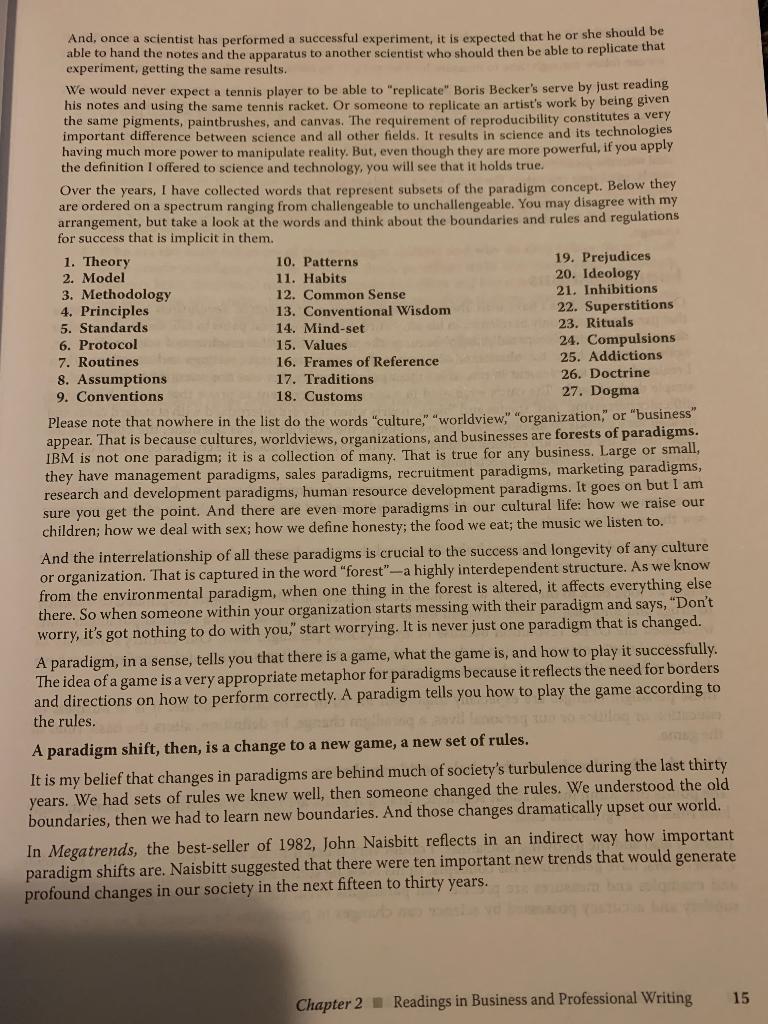This is a professional writing question, this is all the information given.
Theory, model, methodology, principles, standards, protocol, routines, assumptions, conventions, patterns, habits, common sense, conventional wisdom, mind-set, values, frame of reference, traditions, customs, prejudices, ideology, inhibitions, superstitions, rituals, compulsions, addictions, doctrine, dogma
Choose two and describe how your proposal will address. For example, if we use the essay topic of a proposal for a food service facility at CW:
- routine - the students and staff are used to going to the nearby 7 - Eleven, this new food service will change their routine
- theory - students and staff that are well nourished are more attentive
My proposal in population

And once a scientist has performed a successful experiment, it is expected that he or she should be able to hand the notes and the apparatus to another scientist who should then be able to replicate that experiment, getting the same results. We would never expect a tennis player to be able to "replicate" Boris Becker's serve by just reading his notes and using the same tennis racket. Or someone to replicate an artist's work by being given the same pigments, paintbrushes, and canvas. The requirement of reproducibility constitutes a very important difference between science and all other fields. It results in science and its technologies having much more power to manipulate reality. But, even though they are more powerful, if you apply the definition I offered to science and technology, you will see that it holds true. Over the years, I have collected words that represent subsets of the paradigm concept. Below they are ordered on a spectrum ranging from challengeable to unchallengeable. You may disagree with my arrangement, but take a look at the words and think about the boundaries and rules and regulations for success that is implicit in them. 1. Theory 10. Patterns 19. Prejudices 2. Model 11. Habits 20. Ideology 3. Methodology 12. Common Sense 21. Inhibitions 4. Principles 13. Conventional Wisdom 22. Superstitions 5. Standards 14. Mind-set 23. Rituals 6. Protocol 15. Values 24. Compulsions 7. Routines 16. Frames of Reference 25. Addictions 8. Assumptions 17. Traditions 26. Doctrine 9. Conventions 18. Customs 27. Dogma Please note that nowhere in the list do the words "culture," "worldview," "organization" or "business" appear. That is because cultures, worldviews, organizations, and businesses are forests of paradigms. IBM is not one paradigm; it is a collection of many. That is true for any business. Large or small, they have management paradigms, sales paradigms, recruitment paradigms, marketing paradigms, research and development paradigms, human resource development paradigms. It goes on but I am sure you get the point. And there are even more paradigms in our cultural life: how we raise our children; how we deal with sex; how we define honesty, the food we eat; the music we listen to. And the interrelationship of all these paradigms is crucial to the success and longevity of any culture or organization. That is captured in the word "forest"-a highly interdependent structure. As we know from the environmental paradigm, when one thing in the forest is altered, it affects everything else there. So when someone within your organization starts messing with their paradigm and says, "Don't worry, it's got nothing to do with you," start worrying. It is never just one paradigm that is changed. A paradigm, in a sense, tells you that there is a game, what the game is, and how to play it successfully. The idea of a game is a very appropriate metaphor for paradigms because it reflects the need for borders and directions on how to perform correctly. A paradigm tells you how to play the game according to the rules. A paradigm shift, then, is a change to a new game, a new set of rules. It is my belief that changes in paradigms are behind much of society's turbulence during the last thirty years. We had sets of rules we knew well, then someone changed the rules. We understood the old boundaries, then we had to learn new boundaries. And those changes dramatically upset our world. In Megatrends, the best-seller of 1982, John Naisbitt reflects in an indirect way how important paradigm shifts are. Naisbitt suggested that there were ten important new trends that would generate profound changes in our society in the next fifteen to thirty years. 15 Chapter 2 Readings in Business and Professional Writing And once a scientist has performed a successful experiment, it is expected that he or she should be able to hand the notes and the apparatus to another scientist who should then be able to replicate that experiment, getting the same results. We would never expect a tennis player to be able to "replicate" Boris Becker's serve by just reading his notes and using the same tennis racket. Or someone to replicate an artist's work by being given the same pigments, paintbrushes, and canvas. The requirement of reproducibility constitutes a very important difference between science and all other fields. It results in science and its technologies having much more power to manipulate reality. But, even though they are more powerful, if you apply the definition I offered to science and technology, you will see that it holds true. Over the years, I have collected words that represent subsets of the paradigm concept. Below they are ordered on a spectrum ranging from challengeable to unchallengeable. You may disagree with my arrangement, but take a look at the words and think about the boundaries and rules and regulations for success that is implicit in them. 1. Theory 10. Patterns 19. Prejudices 2. Model 11. Habits 20. Ideology 3. Methodology 12. Common Sense 21. Inhibitions 4. Principles 13. Conventional Wisdom 22. Superstitions 5. Standards 14. Mind-set 23. Rituals 6. Protocol 15. Values 24. Compulsions 7. Routines 16. Frames of Reference 25. Addictions 8. Assumptions 17. Traditions 26. Doctrine 9. Conventions 18. Customs 27. Dogma Please note that nowhere in the list do the words "culture," "worldview," "organization" or "business" appear. That is because cultures, worldviews, organizations, and businesses are forests of paradigms. IBM is not one paradigm; it is a collection of many. That is true for any business. Large or small, they have management paradigms, sales paradigms, recruitment paradigms, marketing paradigms, research and development paradigms, human resource development paradigms. It goes on but I am sure you get the point. And there are even more paradigms in our cultural life: how we raise our children; how we deal with sex; how we define honesty, the food we eat; the music we listen to. And the interrelationship of all these paradigms is crucial to the success and longevity of any culture or organization. That is captured in the word "forest"-a highly interdependent structure. As we know from the environmental paradigm, when one thing in the forest is altered, it affects everything else there. So when someone within your organization starts messing with their paradigm and says, "Don't worry, it's got nothing to do with you," start worrying. It is never just one paradigm that is changed. A paradigm, in a sense, tells you that there is a game, what the game is, and how to play it successfully. The idea of a game is a very appropriate metaphor for paradigms because it reflects the need for borders and directions on how to perform correctly. A paradigm tells you how to play the game according to the rules. A paradigm shift, then, is a change to a new game, a new set of rules. It is my belief that changes in paradigms are behind much of society's turbulence during the last thirty years. We had sets of rules we knew well, then someone changed the rules. We understood the old boundaries, then we had to learn new boundaries. And those changes dramatically upset our world. In Megatrends, the best-seller of 1982, John Naisbitt reflects in an indirect way how important paradigm shifts are. Naisbitt suggested that there were ten important new trends that would generate profound changes in our society in the next fifteen to thirty years. 15 Chapter 2 Readings in Business and Professional Writing







